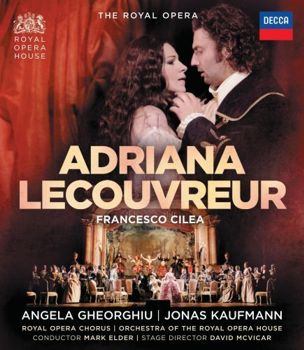|
|
|
|
|
|
|
|
|
Opera News, August 2012 |
| ERIC MYERS |
|
|
|
CILÈA: Adriana Lecouvreur |
|
|
|
Gheorghiu, Borodina; Kaufmann, Corbelli; Royal Opera Chorus, Orchestra of the Royal Opera House, Elder. Production: McVicar. |
|
|

Snoot if you must, but it's no accident that Adriana Lecouvreur
still holds the stage. Cilèa's score may not be "great music" or
possess boundless depth, but the man knew how to write an
effective opera filled with dramatic tension and engaging
melody. (And yes, there are far more than just two big tunes in
the opera; at least a dozen key motifs recur, develop and propel
the action.) It's when Adriana is burdened with indifferent
singers or a lackluster conductor that it suffers. Fortunately,
that is not the case here; this 2010 David McVicar production
from Covent Garden, featuring a starry cast and sensitive
conducting by Mark Elder, makes the best possible case for this
frequently maligned opera.
Certainly any Adriana stands
or falls on its prima donna, like so many other giovane scuola
vehicles, including Giordano's Fedora, Alfano's Risurrezione and
just about every opera Puccini ever wrote. The role of the great
French tragedienne is one Angela Gheorghiu was born to play.
(Insert your choice of snarky diva remark here.) Although she
does not always have the most reliable lower register, every
other weapon in the verismo arsenal is at her disposal — vibrant
temperament, sharp dramatic instincts, clear diction and
throbbing, urgent tone that can be hardened to reflect the
emotions of the moment. Adriana, of course, also requires
lightness and pure vocal beauty for her two major arias, which
Gheorghiu has in abundance. And that great test of a diva's
declamatory skill, the Phèdre monologue in Act III, is thrilling
here.
Gheorghiu is partnered by three singers who
also qualify as true stage animals. Jonas Kaufmann is everything
one could want as Maurizio: dashingly virile of presence and
timbre, he tirelessly pours out passionate, molten sound. He and
Gheorghiu have wonderful chemistry in their love scenes.
Alessandro Corbelli, a singing actor who rarely lets
the audience down, is subtle and touching in the ungrateful role
of Adriana's lovelorn confidant Michonnet. As the Princesse de
Bouillon, Olga Borodina is one scary pit bull, commanding the
stage with her imposing presence and cannonball voice. Her fiery
confrontations with Gheorghiu in Acts II and III are more than
evenly matched.
David McVicar's production maintains the
element of theater throughout: a proscenium arch, situated
upstage, is well integrated into Charles Edwards's evocative set
for each act. One has the sense of a unit production with none
of the budgetary economies that often implies. There is plenty
of appropriate lavishness on view here, not only in the sets but
in Brigitte Reiffenstuel's beautiful eighteenth-century
costumes. The entire production is a cohesive whole to which
McVicar adds some insightful flourishes, such as Adriana's
fellow actors appearing as a ghostly tableau in the opera's
final moments, saluting their deceased colleague.
The
accompanying booklet includes an informative essay on the
musical structure and performance history of Adriana. In a bonus
documentary (really just a series of intercut talking-head
interviews), Gheorghiu, Kaufmann, McVicar, Edwards and Elder
speak out in wholehearted support of this opera, which until
this production (suggested by Gheorghiu) had not been staged at
Covent Garden since 1906. Elder zeroes in on one of the main
reasons Adriana remains a critical scapegoat today. "This opera
has charm," he says ruefully, "and charm is no longer
fashionable, is it?"
|
|
|
|
|
|
|
|
|
|
|
|
|
|
|
|
|
|
|